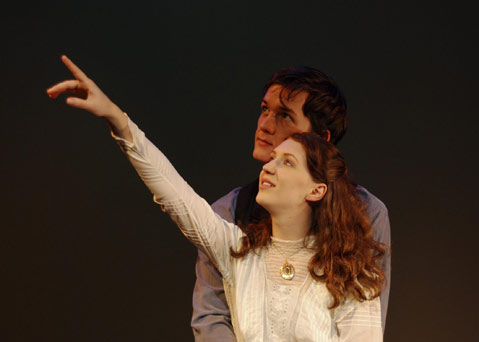Mother and Son Team Take on Chekhov’s Seagull
Irwin and Libby Appel Bring Russian Classic to UCSB

She’s a famous actress. Her son wants to be a playwright, but she can’t bring herself to pay attention to his work. What if that was the premise for a play that involved the collaboration of a real-life mother and son?
This weekend at UCSB, director Irwin Appel takes on Libby Appel’s new adaptation of Anton Chekhov’s Seagull. The son and mother are aware of the parallels, and they’re enjoying the challenge. Libby Appel, who recently retired from the position of artistic director at the Oregon Shakespeare Festival, is one of the English-speaking world’s most renowned interpreters of the Russian playwright’s work. In fact, she is now the subject of a documentary film, Meeting with Chekhov, which can be seen online at coffeeandlanguage.com.
Irwin Appel has brought his mother’s new adaptation of Chekhov’s Seagull to the UCSB BFA program in theater because he believes in the work and in the talent of the students in his program to perform it. I spoke with mother and son last week about their experience working together on this project.
This is a difficult work. What made you decide to take it on?
Irwin Appel: I would not have chosen Seagull if I had not had an Arkadina. In fact, there were five or six possible choices for the role, and Natasha Lloyd, who was chosen, will be great. The same is true of the role of Trigorin. I played Trigorin myself when I was much too young to understand him.
Do you think that college students can play these parts effectively?
Yes, although I understand the challenges. The issues in the play are those that occur in long marriages or when someone enters a midlife crisis. Yet this cast is getting it. Otherwise I couldn’t do the show.
How do you see Seagull as fitting into your work as a teacher?
I have a mission to expose my actors to great material and offer them the opportunity to work on the best plays, but it still always has to be a good show. I would never choose to flounder with something that was over everyone’s head. What we take on, we have to pull off.
What has it been like to work with your mom on this?
The experience has been extraordinary. Chekhov has meant a lot to my mother. Russia is where my family came from. It’s different for us as Russian Jews, yet the culture was so important, especially the theater, this theater, Chekhov. He was one of the things they carried to the new world.
What’s special about working with your son?
Libby Appel: Of course the central motif of Seagull is a mother and son, and they have a troubled relationship. When you examine a play with a director, inevitably personal things come up. But Irwin and I have been talking shop together since he was 11 years old. There is a tremendous candor that we have achieved. There has never been a defensive moment.
You became a successful director and professor of theater in the 1980s. What was it like for a woman in the profession at that time?
I suppose I was always against the glass ceiling, but I tended to concentrate as much as I could on the work, rather than be consumed by the politics. There was considerable intransigence among male faculty members when I first began to teach. And when I arrived there, the Oregon Shakespeare Festival wasn’t just an old boy network-it was an old cowboy network. But they kept inviting me back-five times in four years.
Which would you choose, Chekhov or Shakespeare?
It’s impossible to choose. Shakespeare is more epic and ritualized. Chekhov is maybe more intimate. What they share is an ability to look beyond just what is happening or being said, and to illuminate the darkness beneath.
What’s the most important thing to remember about the theater?
People don’t come to the theater to feel good-they come to feel.
4•1•1
Seagull performs Fri.-Sat., Feb. 13-14 and Tue.-Sat., Feb. 17-21 at 8 p.m. and Sat.-Sun., Feb. 14-15 and Sat., Feb. 21 at 2 p.m. at UCSB’s Performing Arts Theatre. For tickets, call 893-7221or visit theaterdance.ucsb.edu.



